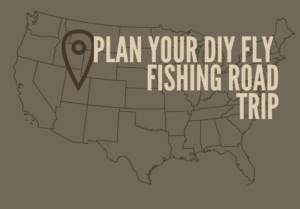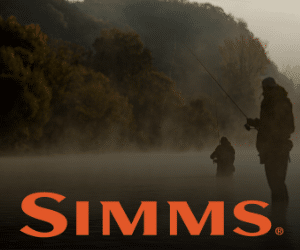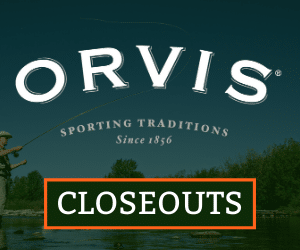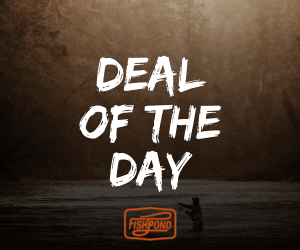So you are looking to plan a fly fishing road trip huh? Congratulations! There is a lot of work that goes into getting a road trip planned and executed, but there is nothing like the feeling of finally reaching your destination to catch fish!
How to Plan The Perfect Fly Fishing Road Trip
- Time
- Location
- Fishing holes
- Budget
- Lodging/ camping
- Gear
- Survival
- Extra
How to Plan The Perfect Fly Fishing Road Trip
Getting all the pieces moving in the right direction can be kind of a process when planning your fly fishing trip. In this article I’m going to show you a broad view of what you are going to want to know, before you get out to the rivers!
Now, I will say this, when I plan a fishing trip for a new location, I always have surprises that pop up when I start my trip/ reach my destination. Anything can happen! I can plan an entire trip to a T and I’ll get something that pops up. Flat tire, car breaks down, wild fires, anything! Realizing this before hand can save you a lot of stress when something does happen.
First things first…
Time
The first step in planning a fishing trip is knowing the time you’ll have to spend. This might seem obvious, but if you understand the time aspect of your trip, it can allow other parts to flow smoother. What I like to do is essentially budget my time in different locations. If I’m staying in a hotel one night, well, I want to know when I’m going to be getting there and the best time to leave, to optimize daylight. Especially if you are camping and need to set up tents and such. You’ll want to plan your trip knowing that you can set everything up during the sunlight hours (unless that doesn’t affect you, besides the point).
If you know what you are doing before hand, it’ll decrease the amount of time that you waste while driving to your spot. Bottom line, just work on budgeting your time as best as you can.
Location
The best part! Finding the state that you want to fly fish in! If you are planning a fly fishing trip out west, don’t worry too much about whether the fishing is going to be good or not. A lot of it’s the experience and the Rocky Mountains will show you a good time! But, before you pick the state you will be fishing in, check the rules and regulations there. It would suck to get out to Wyoming and find out that you can’t even fish for two weeks (random example).
You also want to make sure that you have a gas route planned out, all the way to your location. Or bring extra gas… it would not be fun to get stuck in the middle of nowhere without gas, unless you could fish there! Then it’s just a slight change of plans!
Fishing Holes
If you are wondering, “How to I find the best fishing holes?” I have a suggestion for you. Get the OnX app (or some hunting/ fishing app), pick the state you are fishing in, purchase the subscription for that state. This is going to give you streams, public land, access points, and more valuable information. You’ll also probably want to use google maps and use the 3D feature. This is going to give you a lay of the land before you get out there.
When I get on my apps and start looking for fishing holes, I like to find a general area where I have a decent amount of streams and rivers, within a certain radius. They all have to have access access points, or they’re irrelevant. When you find an area with a lot of fishing streams/ rivers, find an area to make your home base. Unless you are planning on jumping around from stream to stream while camping at different spots each night.
If you are going to be camping/RV’ing a new spot every night (props to you) well then you are going to have find rivers/ streams to fish in during the day, and a place to stay at night. Same process although, find an area where you can access water and then stay the night at the same time.
If you ask me, I like to road trip to a single area and then make a base camp. I can still drive around in the general vicinity, but it just takes away the hassle of finding a new spot every night. UNLESS you have a van/ RV/ camper, then you can just find a spot and park it. (I like to camp).
Budget
You are going to want to know how much you can spend on this trip of yours. It probably isn’t going to be the cheapest trip ever, but that’s alright! Things to keep in mind, lodging/hotels, gas, rental car (if you’re renting), licenses, food, extra fly rods and reels, gear, and then add some more on top of that for emergencies.
Vehicle
Are you renting? Will your rig make it to the planned destination? It’s running smoothly? Otherwise, do you have an idea of what you will be renting? These are all important questions. If you do rent, make sure that it will have enough space and other features that you want. And maybe get it a day early, you don’t want to have problems with the rental car directly as your trip starts. Figure that stuff out before!
Lodging/ Camping
Where are you going to be staying? Are you going to be driving to a spot, making a home base, then fishing in the area? Or, are you going to be on the move the entire time? You want to know where you will be staying before hand if at all possible. If you plan out the time factor of your trip you can see the best locations to stay at, based on how far you can travel in a day. Simple math, just know it before you leave so you can optimize your time and money.
Gear
Is your gear up to date? How about all of your fishing equipment? You will want to look through all of your equipment well in advance so you’re not surprised when the time finally comes! If you want to read more about fishing equipment, this link will take you to our article page with recommendations for you. Gear is important, do not get out to the Rocky Mountains and realize that your reel is broken or falling apart.
Survival
If you are planning a trip where your plan is to head out into the brush, bring a survival pack. Anything can happen out on the river so you have to be prepared. Even if you aren’t going that far, bring at least a fire starter and a survival thermal jacket or tent.
Extra
Bring extra money for this trip, emergencies pop up and you’ll want to be ready for anything. I would suggest bring several different pairs of clothes in case of rain. It’s not a bad idea to bring an extra fly rod or reel. I’ve been on trips where my clothes got wet or where I broke a rod and didn’t have a back up plan with me. It’s not so great. Trust me.
In the end it’ll be a blast.
Planning the perfect fly fishing trip can be a long process but very rewarding in the end! The feeling of pulling in your first fish out of a crisp mountain water stream is like nothing else in the world. The anticipation of all the planning will make that trout fished from a clear river stream so much better. Tight lines my friend and good luck!



